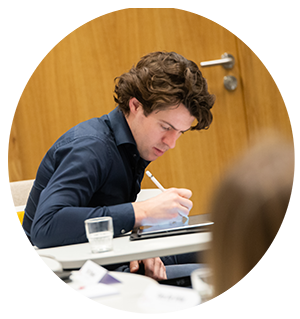Theo van Leest is owner of the Digital Legit Company. DLC helps organizations to tackle the challenges of IT projects and understand their impact on business. To improve his customer services, Theo wanted to gain insight into the financial ins and outs of an organization. He was already familiar with balance sheets and accounts but wanted to learn how to really interpret them. The BENE program, Business Economy for Non-Economists, turned out to be the perfect starting point.

“Before registering, I talked to several alumni who, like me, have their own company. I wanted to know what they had learned from the program. They told me that they were able to apply the insights from the program to their own company. It goes without saying that, as a business owner, you need to properly understand your accountant. You must be able to ask him the right questions in order to get the proper answers. They also confirmed that they were able to put the knowledge to use for their customer services as well. It helped them to better assess and define potential business cases and to close a deal.”
“I knew about balance sheets and accounts, of course, but I had no idea how to use different types of financial ratios in order to find out how well an organization is doing. One of the professor’s remarks really stuck with me: 'An organization can seem to be thriving while it’s actually critically ill and vice versa: an organization that seems to be doing badly, may be in perfect health. That has really become clear to me throughout the program.”
"You can only spend your money once, so you'd better make sure you spend it wisely."
“If you want to improve your organization, you need to invest. And of course you need to make the right investment decisions. But how do you go about that? You can only spend your money once, so how can you make it grow for sure? During the program we learned to use different kinds of methods to calculate the net proceeds of investments. Understanding how this works, helps you to decide whether or not to embark on a project and to anticipate.”
"I prefer to think things through beforehand."
“As a self-employed person, I advise organizations on their (IT) investments. These can be quite challenging: organizations tend to invest a lot of money in software but most of the time they fail to achieve the results they expected. They don't always realize the enormous potential of IT and miss out on opportunities. This has a lot to do with their level of understanding of technology. I always try to map this out beforehand so that you can still make adjustments during the project or process. I prefer to think things through beforehand instead of reflecting afterwards. I was very surprised to see that budgeting can be a really big help in this. The budgeting module has made me realize that budget is so much more than just a bunch of money; it really opened up a whole new world for me.”
"The program was very well-structured."
“The strategy module is also very useful. Strategy in itself has nothing to do with finances, and yet the two are closely connected. You may have big ideas for your organization and write them down in a well-defined mission, vision and goals. But once you have done that, it’s time to start implementing your strategy. And that takes time, and time is money…
The same applies to integrated performance management, which was a very interesting module too. If you combine that with strategy, you get a dashboard of your organization: you can see how well you are doing compared to your competitors. And if you add the financial layer on top of that, you get the full picture. The program was thus really well-structured. We touched upon all the important aspects of an organization.”
"Every class is a combination of theory and practice."
“It was tough though, at times. We all have different likes and dislikes, that’s how it works. I for one am glad that I don't have a career in the financial world. But the program showed me that it all begins and ends with good budgeting. BENE is an excellent program for people like me, who have to deal with finances without having a financial background. It immerses you in the most important aspects of finances during a short period of time. And sure, you can find a lot of information online, but having real life professors who are familiar with both theory and practice, is a big advantage. They know it's nice to have everything mapped out on paper, but they also understand that in real life you need to be flexible from time to time.
Every single class was a combination of theory and practice. That way you get a solid starting point to start assessing organizations, including your own.



